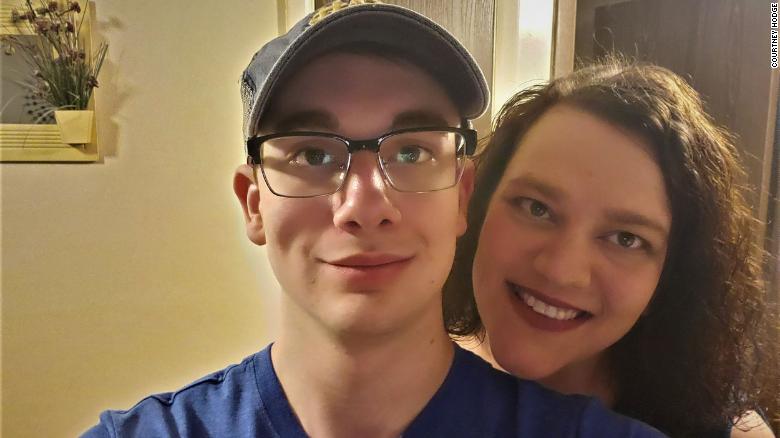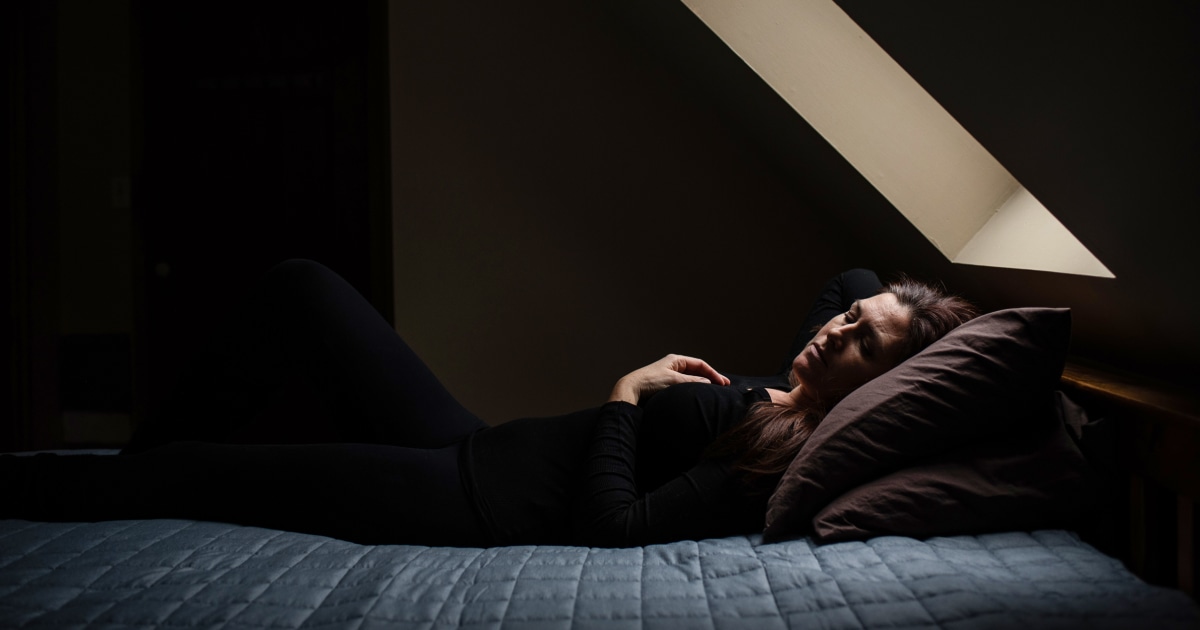Covid-19 survivor returns to hospital to apologize to doctors 2:15
(CNN) -
Wearing a double mask, staying home almost 24/7 and rarely seeing people other than his wife are still the way of life for kidney transplant recipient Andrew Linder. , even after many in America live as if the pandemic is over.
Health officials recommend a third and even a fourth dose to increase resistance to COVID-19 in people with certain conditions, but that has not alleviated the fears of some immunosuppressed people.
Linder, 34, received the life-changing gift of a kidney from his wife, Emily, in September 2019. He will take immunosuppressants for the rest of his life to prevent his body from rejecting the organ.
In March 2020, when COVID-19 cases started closing workplaces and cities, Emily moved with her parents for months because she works with the homeless and people in the prison system and she didn't want her husband to get sick.
The coronavirus vaccines gave the Linders, who live in Akron, Ohio, some hope.
Andrew Linder received two doses of the Pfizer vaccine and then an additional dose and a booster.
Hope quickly turned to anguish.
Andrew and Emily Linder were married a month before she gave him a kidney.
Covid-19 increased deaths by 16% and also affected mental health in OECD countries, according to a report
"He had no antibodies of any kind. That was shocking, scary and a bummer for sure," Linder told CNN.
"I feel almost as unsafe or, if not potentially, a little more unsafe now than when the pandemic started, just because I could get it right now."
advertising
The pandemic is not over for many
Linder is one of many moderately to severely immunosuppressed people trying to protect themselves, while many people in the US are returning to some version of their normal lives.
The U.S. Centers for Disease Control and Prevention (CDC) estimate that about 9 million people living in the U.S., or about 3% of the population, are moderately to severely immunosuppressed. .
That includes people on active treatment for blood cancers or solid tumors, certain organ and stem cell transplant recipients, people with advanced or untreated HIV, and those taking high-dose corticosteroids or other medications that can suppress their immune systems. .
A new study published by the CDC last week suggests that people with compromised immune systems may need to receive three doses of a coronavirus vaccine and a booster dose to get the most protection that the two doses provide to those who are not immunosuppressed.
The effectiveness of the Pfizer and Moderna vaccines against COVID-19 hospitalization was 77% among immunosuppressed adults versus 90% among immunocompetent adults.
For transplant recipients like Linder and some other members of the immunosuppressed community, the research showed that the effectiveness of the vaccine was less than that.
A brothel offers free admission to those who are vaccinated against covid-19
Feel more free to go out
CNN followed up with five immunosuppressed people interviewed in March 2020. For some, like Linder, life hasn't changed much due to their lack of immunity.
Others have acquired a sense of security after receiving vaccinations and boosters.
For Courtney Hodge, a single mother from outside Pittsburgh, living through the pandemic has given her a new sense of clarity and she said she is trying to live with less fear.
Last year "it made me re-evaluate my whole life because you can die this fast," Hodge told CNN.
Courtney Hodge is a single mother to her college-aged son, Austin.
The 39-year-old woman has asthma and several autoimmune disorders, including Graves' disease, fibromyalgia, and chronic fatigue syndrome.
Given how depressed his immune system is, Hodge worries that he won't be able to fight the damage the coronavirus causes to his lungs.
"I'm fully vaccinated with the booster, (so) I've been hanging out and talking to more people than in my entire life," Hodge said.
He said he received a booster in August and would consider a fourth dose if necessary.
Being vaccinated and boosted has also given Hodge the confidence to feel safe going to craft shows and vendors to promote the candy business that started during the pandemic.
"I'm not that anxious anymore and I don't feel an impending doom anymore," she said.
"Even if I get sick with the vaccine, my chances of dying are not as high as without the vaccine."
ANALYSIS |
Covid-19 vaccine debate takes a strange turn
Has returned to shopping
Embracing life and trying to return to the world is also what Danielle Grijalva has tried to focus on, despite the fact that some people around her fell ill and lost a friend to COVID-19, she said.
Grijalva received her first and second covid-19 vaccinations in April and May, respectively, and said the vaccination changed her perspective, allowing her to go from staying home to feeling safe enough to go shopping or see friends. .
"Now I can, I feel comfortable walking and shopping, and I keep my distance," said the 45-year-old.
"I have simply decided that I am not going to live in fear."
Danielle Grijalva is living with less fear now that she is vaccinated.
The California mother of two was diagnosed in 2018 with a pain condition called fibromyalgia, chronic fatigue syndrome and various strains of echovirus, which were found in her stomach.
However, her conditions do not place her among the group of immunosuppressed people who are recommended to receive an additional dose, and it has not yet been six months since her first vaccination.
He said he will be eligible for his booster shot this month.
Regardless, he said he's happy to see the reopening in the US and enjoys seeing good friends and getting back to feeling a bit of normalcy.
Immunosuppressed people may need a fourth dose of the COVID-19 vaccine, according to the CDC
She still contracted covid-19
There are days when Brittania Powell can't get out of bed.
When he contracted COVID-19 in 2020, he had symptoms for a month.
But not all of the immunosuppressed people CNN followed were able to stay healthy and COVID-19 free.
Ohio State University student Brittania Powell barely left her home for two months last fall until her family encouraged her to work at the polls in Ohio on Election Day 2020, she said.
Powell was diagnosed with the autoimmune disease lupus when he was 14 years old.
He also has an autoimmune disease called rheumatoid arthritis, anemia, and lupus nephritis, which inflames his kidneys.
He does not know if he will wake up with swollen joints or if he will be able to move on any given day.
The 22-year-old said she and the other poll workers tried to disinfect common surfaces and keep things clean, but some of the people who came to vote were not wearing masks.
"I was wearing a double mask, although I was wearing gloves, but I still caught it (covid-19)," he said.
Powell felt like he had the flu for a week and only coughed for one day, so he didn't think he had COVID-19 at the time, he said.
The following week she had severe nausea and stomach problems, which sent her to the emergency room.
The next morning, he said he had a positive test result.
Stomach problems stuck with her and she didn't feel better for a month.
Despite feeling ill, Powell said she stayed positive and tried not to stress herself while recovering.
What might the end of the covid-19 pandemic look like?
She received both doses of the vaccine this spring and said she is not in a rush for a booster yet.
However, it has a message for other people.
"You won't know who's immunosuppressed just by looking at them," Powell said.
"Be considerate of those around you, even if you do not want to receive the vaccine, wear your mask at least. Follow the safety protocols we use so as not to risk the lives of others."
She is still worried about her health
For Eileen Davidson, receiving treatments for her rheumatoid arthritis became a challenge during the pandemic.
The need for people to be on the lookout for those who may be most susceptible to COVID-19 is real for Eileen Davidson, a Canadian writer for an arthritis website.
The 35-year-old woman is a single mother with rheumatoid arthritis.
She lives with her 8-year-old son, Jacob, in Vancouver, British Columbia.
"Some people think the pandemic may be ending; it really isn't over for someone who is immunosuppressed," Davidson said.
At first, the confinement was a good thing, as Davidson said he could relax.
But not having access to physical therapy and her gym made managing her chronic condition difficult.
"It got worse, there was a lot of stress," he said.
"Even the stress around the pandemic can lead to someone having increased disease activity."
After waiting and seeing the first Americans get their shots, Davidson was able to get his first dose in April and his second in June, as Canadian experts advised extending the time between doses.
He also received a booster shot two weeks ago.
But another stressor emerged when demand increased for the drug he uses to control his rheumatoid arthritis, a biologic called Actemra or tocilizumab.
Global cases of covid-19 exceed 250 million
In June, the US Food and Drug Administration (FDA) granted Actemra an emergency authorization for the use of hospitalized COVID-19 patients.
It is a monoclonal antibody therapy that helps reduce inflammation that can make patients sicker.
"I am concerned that my medication, which I desperately need and have been through so many to find the right treatment for me, is in short supply because people refuse to get vaccinated," Davidson said.
They just want to get back to normal
Among the immunosuppressed, a common thread is the desire to live their lives.
For Linder, the idea of not being able to regain something of normalcy at some point is overwhelming.
"For me not being able to live a life that I again fought so hard to achieve and for my wife to donate a part of her body so that we could live a life together, it just hurts," he said.
"It cuts so deep it's a pain I can't explain."
Linder said a stranger in a grocery store, where Linder goes when he's desperate and just needs to get out of the house, once yelled at him that he didn't need a mask and that the pandemic is over.
Note: That stranger is wrong.
None of those things are true.
He said that he feels "a lot of jealousy, a lot of envy because the message that has been clearly introduced into society at this time is that if I don't want to risk dying, I just have to stay home and I need to stay at home forever," he said. .
Half of the world's population is at least partially vaccinated against COVID-19, according to Our World In Data.
So goes Latin America
Linder dreams of finally going on a honeymoon with his wife;
their second anniversary is coming up in December.
That trip won't happen anytime soon, because they know it's not safe for him to fly.
For now, she hopes to see her sister, her husband, and her nephew over the holidays.
They're not sure what that would be like, but he said it would be nice to have a vacation with his family for the first time in two years.
CNN's Jen Christensen and Jacqueline Howard contributed to this report.














